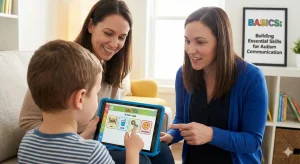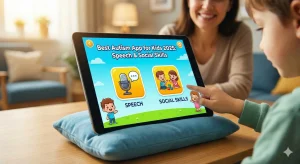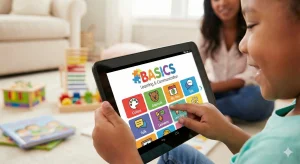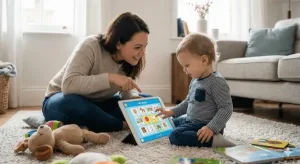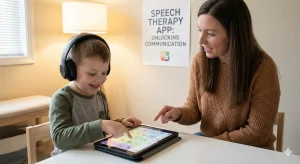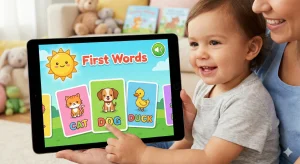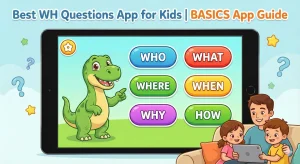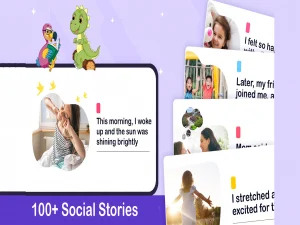What Parents Can Learn from Sitaare Zameen Par
By Wellness Hub
Last Updated: June 9, 2025
India is on the cusp of a meaningful shift in how we view childhood development—and the upcoming film Sitaare Zameen Par is helping spark that change. While the movie hasn’t hit theatres yet, its early buzz suggests a strong focus on neurodiversity, particularly how children experience the world differently through conditions like autism, ADHD, or learning disabilities.
This blog isn’t a review, but rather an exploration of what Indian parents can begin reflecting on—even before the film’s release. As the conversation around autism and inclusion gains momentum in India, now is the time for families to understand the early signs and support their child’s unique journey with awareness and compassion.
If you’re wondering what developmental differences may look like in your child, our resource below can help.
Speech Delay in Indian Kids: A Guide for Parents in the USA
Curious about early signs of developmental differences? Explore our checklist for autism in children.
What is Neurodiversity? A Parent-Friendly Explanation
Understanding your child’s unique way of thinking starts with one powerful concept: neurodiversity. As parents, especially in today’s evolving world, it’s important to know that not every child’s brain works the same way—and that’s okay. Neurodiversity helps us view these differences as part of natural human variation, not as flaws that need to be fixed.
What Does Neurodiversity Mean?
Neurodiversity is the idea that neurological differences—how the brain thinks, learns, processes, and responds—are just another part of human diversity. This includes differences like autism, ADHD, speech delays, and learning difficulties. Instead of labeling children as “normal” or “abnormal,” the neurodiversity approach recognizes that all brains are wired differently, and each child brings a unique perspective to the world.
This concept encourages acceptance, early support, and empowerment—helping parents see their child’s potential beyond the challenges.
Common Neurodiverse Conditions Parents Should Know
Neurodiversity includes a range of conditions that many parents may come across. Here are some of the most commonly observed ones:
- Autism Spectrum Disorder (ASD): Children with autism may communicate, interact, and process the world differently. They might show strong interests in specific topics, need routine, or prefer visual learning.
- Attention-Deficit/Hyperactivity Disorder (ADHD): Kids with ADHD often have high energy, may struggle to focus, or act impulsively. However, they’re also imaginative, enthusiastic, and full of curiosity.
- Speech Delay: Some children take longer to start talking. This can be due to developmental patterns, hearing issues, or neurodevelopmental conditions—but early support makes a big difference.
- Learning Difficulties: These include challenges like dyslexia (reading), dyscalculia (math), and dysgraphia (writing). These kids are often creative thinkers who may excel when taught differently.
Understanding these conditions helps parents notice signs early and take action with compassion, not fear.
Celebrating Strengths Alongside Challenges
It’s easy to focus on what a child struggles with—but neurodiversity also teaches us to look for their strengths. Many neurodivergent children show incredible skills, such as:
- Exceptional memory
- Strong attention to detail
- Creative problem-solving
- Deep emotional insight
- Visual or musical talents
- Unusual focus in areas of interest
When parents and caregivers support these abilities early, children can grow with confidence and pride in who they are.
At Wellness Hub, we believe that every child deserves to thrive—not despite their differences, but because of them.
Why Media Representation Like This Matters
When Taare Zameen Par premiered, it didn’t just entertain — it educated. The film sensitively portrayed the struggles of a child with dyslexia, breaking the silence around learning differences in Indian households. It helped many parents recognize signs they had overlooked and encouraged schools to rethink how they supported diverse learners.
Now, with Sitaare Zameen Par expected to spotlight autism, there’s an opportunity to take that awareness even further. Media plays a powerful role in shaping perceptions. A story that openly talks about neurodiversity can spark essential conversations at home, in classrooms, and in our communities. It has the potential to normalize differences, reduce stigma, and highlight the strengths that come with conditions like autism.
But awareness is just the first step. True inclusion begins with understanding and support. As parents, this means being proactive — observing your child’s communication, recognizing early signs of developmental delays, and seeking expert help when needed.
Want to support your child beyond the screen? Try our online speech therapy. Our therapists understand cultural nuances and provide personalized support to help your child thrive.
Early Signs of Neurodiversity Parents Shouldn’t Ignore
Not every child follows the same developmental timeline—and that’s okay. Neurodiversity is about understanding that brains work differently, not wrongly. Some children may speak later, interact differently, or prefer routine. These could be natural traits—or early signs of conditions like autism, ADHD, or learning differences. The key is to observe, not label.
Let’s look at a few early signs based on age groups, so you know what to watch for gently and responsibly.
Age-Based Signs to Observe
| Age Group | Possible Signs of Neurodiversity |
|---|---|
| Toddlers (1–3 years) | – Limited eye contact – Doesn’t respond to name – Delayed speech or babbling – Repetitive movements (hand-flapping, rocking) – Lack of pointing or joint attention |
| Preschoolers (3–5 years) | – Difficulty with pretend play – Repeats words/phrases (echolalia) – Extreme sensitivity to noise, lights, or textures – Struggles with transitions or routines – Poor social interaction |
| Teens (13–18 years) | – Social withdrawal or difficulty forming peer relationships – Rigid thinking or strong adherence to routines – Anxiety in social situations – Difficulty understanding sarcasm or figurative language – Hyperfocus on specific interests |
| Adults (19+ years) | – Challenges in workplace communication or adapting to new environments – Sensory sensitivities (light, sound, texture) – Trouble reading social cues or body language – Preference for solitude – History of feeling “different” or misunderstood |
Gentle Observation Leads to Empowered Support
Noticing a sign doesn’t mean something is “wrong.” It simply opens the door to supporting your child’s strengths and needs in the best way possible. If you’ve observed patterns that concern you, the next step isn’t panic—it’s clarity.
Check in with a professional for a Free Developmental Assessment. Early understanding can lead to personalized strategies that truly help.
Remember: Every Brain is Unique
You’re not alone in this. Many families have walked this road with love, curiosity, and care. Keep watching, keep learning, and most importantly—keep supporting your child for who they are.
How Wellness Hub Supports Neurodiverse Children with Real Solutions
When raising a neurodiverse child, every milestone can feel different—and sometimes overwhelming. As a parent, you want support that not only understands your child’s unique needs but also provides practical tools to help them grow. That’s exactly where Wellness Hub steps in.
We don’t just talk about neurodiversity—we offer real solutions designed for children with speech delays, autism, ADHD, sensory processing issues, and social communication challenges.
Personalized Online Therapy for Children
Wellness Hub provides expert-led online therapy services tailored to each child’s strengths and challenges. Whether it’s:
- Speech therapy to help with articulation, first words, or expressive language
- Occupational therapy to build daily life skills, focus, and sensory integration
- Behavioral therapy to support emotional regulation and positive social behavior
Our flexible therapy sessions are delivered by licensed professionals—making it easier for families, especially in remote areas or with busy schedules, to access quality care from home.
Explore Online Therapy Services »
BASICS App: Early Learning, Anytime, Anywhere
Our BASICS App (Behavior, Attention, Speech, Interaction, Communication, Social skills) is designed to support early communication, vocabulary building, and social development in young children.
- Helps with first words, eye contact, imitation, and social play
- Features structured learning modules and daily routines
- Easy for parents to use at home, even without clinical supervision
Available for free on: Android | iOS
Using BASICS regularly encourages parent-led interaction while tracking developmental progress.
Flashcards, Therapy Games & Social Stories
We believe in combining structured therapy with fun learning tools. Our interactive flashcards, therapy games, and social stories make it easier for children to understand complex emotions, vocabulary, and behavior patterns.
- Therapy Flashcards » help build language through visuals
- Therapy Games » teach sequencing, WH-questions, and articulation in an engaging way
- Social Stories » simplify real-life scenarios to prepare children for daily interactions
These tools are designed with input from speech-language pathologists, occupational therapists, and child psychologists—ensuring they are evidence-based, age-appropriate, and parent-approved.
Bridging Awareness with Action
At Wellness Hub, we know awareness is just the first step. That’s why we go beyond education—we equip families with the right therapeutic tools, expert guidance, and tech support to ensure their children feel seen, supported, and empowered.
Whether you’re starting with flashcards or seeking full therapy support, Wellness Hub walks with you every step of the way.
Take the Next Step
- Try our Therapy Flashcards to begin language learning at home.
- Download the BASICS App to boost early communication in daily routines.
- Explore Online Therapy with trained experts who understand your child’s needs.
Because every child deserves support that meets them where they are—and helps them thrive.
Small Steps Parents Can Start With Today
Supporting your child’s development doesn’t always require big changes. Sometimes, it’s the small, consistent efforts that make the most difference. If you’ve started noticing signs of speech delay, learning differences, or behavioral challenges, here are some simple actions you can take right now:
1. Observe Daily Routines Thoughtfully
Start by quietly observing your child’s everyday activities—like mealtimes, playtime, or story time. Are they trying to communicate in their own way? Do they respond to their name? These small cues can offer valuable insights into how they learn and express themselves.
2. Talk to Teachers and Caregivers
Your child’s daycare provider, preschool teacher, or nanny might notice things you don’t. Open a line of communication and ask if they’ve observed any challenges with language, attention, or social interaction. This feedback can help paint a clearer picture.
3. Make Learning Fun With Games and Flashcards
Use engaging tools like games and flashcards to make everyday learning enjoyable. For instance, try our WH Questions Game to boost your child’s comprehension and critical thinking through playful conversation starters. These fun exercises can also reveal how your child processes questions and responds in social settings.
4. When in Doubt, Seek Professional Support
If you’re unsure whether your child’s development is on track, it’s okay to ask for help. Early support often leads to better outcomes. You can explore the BASICS Therapy App, designed to help parents monitor, engage, and connect with expert therapists from the comfort of home.
Conclusion: Let This Film Be a Starting Point
Sitaare Zameen Par is more than just a touching film — it’s a wake-up call for all of us. It sheds light on the struggles and brilliance of neurodiverse children, reminding parents that every child deserves understanding, support, and the right kind of guidance. But awareness through cinema is only the beginning.
Real change begins at home — with informed parenting, timely intervention, and a willingness to unlearn outdated beliefs. If you’ve noticed your child learning or communicating differently, don’t wait for things to get worse or clearer. Start small. Start now. Talk to a professional. Observe closely. And above all, believe in your child’s potential.
Recognizing neurodiversity early and supporting it with the right tools can open up a world of growth, learning, and joy — for both the child and the family.
Parenting a neurodiverse child takes strength and support. Wellness Hub is here to walk that journey with you.
Explore our online therapy services tailored to your child’s unique needs — expert-led, accessible, and built for real progress.
Frequently Asked Questions
1. What is neurodiversity in simple terms?
Neurodiversity refers to the natural differences in how people’s brains function. It includes variations like autism, ADHD, learning disabilities, and speech delays. It simply means that not all children learn, communicate, or behave in the same way — and that’s okay.
2. Is Sitaare Zameen Par based on a true story?
No, Sitaare Zameen Par is not based on a true story, but it is inspired by the Spanish film Champions (2018) and focuses on inclusion, empathy, and working with neurodivergent children in a sports setting.
3. How can I tell if my child is neurodiverse?
Early signs can include delayed speech, lack of eye contact, difficulty socializing, sensory sensitivity, or repetitive behaviors. If you notice such signs, it’s a good idea to speak to a developmental expert or take an early screening.
4. What age can I start noticing signs of autism or ADHD?
You can start noticing early signs as young as 12 to 18 months, especially if your child is not responding to their name, not pointing, or not using simple words by age two. ADHD signs often appear closer to 3–5 years, usually linked to attention, restlessness, or impulsivity.
5. Does watching movies like Sitaare Zameen Par help raise awareness?
Yes. Films like Sitaare Zameen Par can help parents and educators better understand neurodiverse behaviors, reduce stigma, and open up important conversations. However, they should be followed up with real-world learning and support.
6. What kind of therapy does Wellness Hub offer for neurodiverse children?
Wellness Hub offers online speech therapy, occupational therapy, behavioral therapy, and parental counseling. It also provides tools like the BASICS App, flashcards, and social stories to support children with autism, ADHD, and speech delays.
7. Can neurodiverse children attend regular schools?
Many neurodiverse children thrive in regular schools with the right accommodations, support systems, and inclusive teaching strategies. Early intervention helps make this transition smoother.
8. How does the BASICS App help neurodiverse children?
The BASICS App is designed by therapists and includes interactive games, roleplay videos, articulation tools, and vocabulary-building activities that help children improve communication, focus, and social interaction — all from home.
9. What should I do if my child is showing signs of speech delay?
Start by observing patterns, using visual tools at home, and talking to your pediatrician. You can also book an online consultation with a speech therapist at Wellness Hub for a professional evaluation and guidance.
10. Is there a cost to get my child evaluated at Wellness Hub?
Wellness Hub offers free online consultations for parents who want to understand their child’s development better. From there, personalized therapy plans or tools can be recommended based on your child’s needs.
Book your Free Consultation Today
Parent/Caregiver Info:
Client’s Details:
* Error Message

